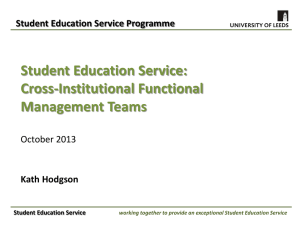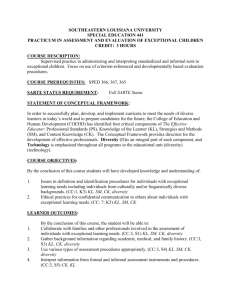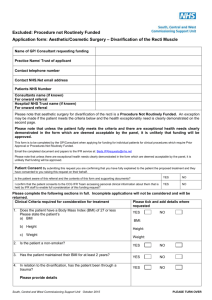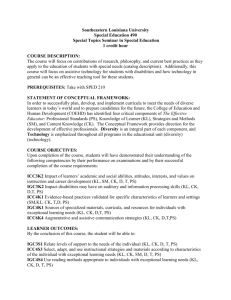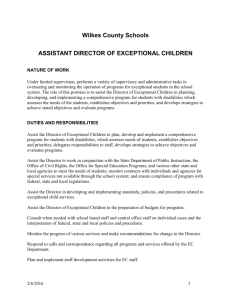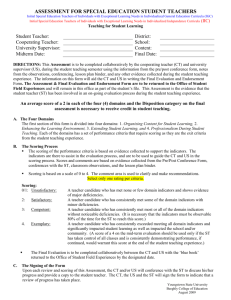SPED 3009
advertisement
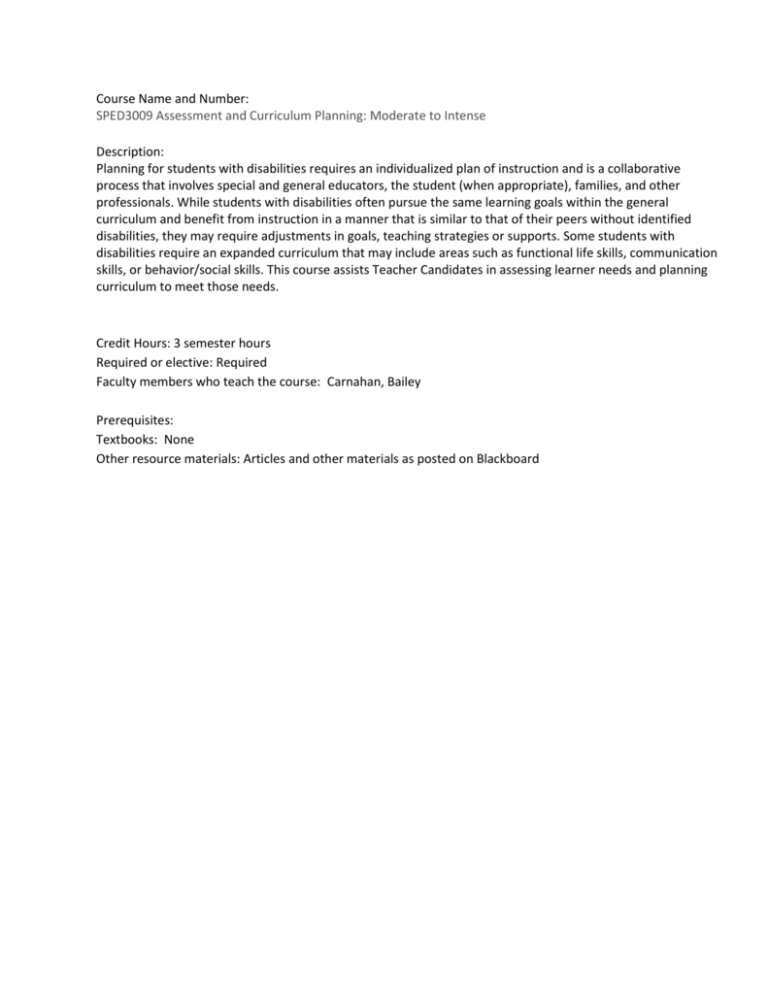
Course Name and Number: SPED3009 Assessment and Curriculum Planning: Moderate to Intense Description: Planning for students with disabilities requires an individualized plan of instruction and is a collaborative process that involves special and general educators, the student (when appropriate), families, and other professionals. While students with disabilities often pursue the same learning goals within the general curriculum and benefit from instruction in a manner that is similar to that of their peers without identified disabilities, they may require adjustments in goals, teaching strategies or supports. Some students with disabilities require an expanded curriculum that may include areas such as functional life skills, communication skills, or behavior/social skills. This course assists Teacher Candidates in assessing learner needs and planning curriculum to meet those needs. Credit Hours: 3 semester hours Required or elective: Required Faculty members who teach the course: Carnahan, Bailey Prerequisites: Textbooks: None Other resource materials: Articles and other materials as posted on Blackboard Learning Outcome: How is this outcome assessed? 1. Select, develop and use variety of diagnostic, formative and summative tools to assess the needs of students with moderate to intense disabilities. Case study, quiz 2. Describe their commitment to helping students with moderate to intense disabilities achieve their full potential by using assessment results to develop observable, measurable individualized goals and objectives that connect to relevant life experiences and career goals. Case study 3. Develop systematic instructional activities that align with each student’s individualized learning goals. Case study assignment 4. Link goals, objectives, and instructional activities to the academic content standards, including alternate assessment applications as appropriate. Case study assignment, IEP homework 5. Communicate assessment results, individualized goals and objectives, and instructional plans systematically to students, parents, and colleagues. Case study assignment Alignment with Transformation Initiative: In view of this conceptual framework and our urban mission, the goal for our Transformation Initiative is to improve the performance of students in high needs schools by preparing educators who recognize the moral imperative to meet the needs of each student. We will prepare educators who are committed to each student, caring about each individual, and competent in evidence-based and data driven instruction. Implementation of research-based strategies. Alignment with Conceptual Framework: This course addresses these institutional standards: Preparing candidates with foundation knowledge, including knowledge of how each individual learns and develops within a unique developmental context. with content knowledge, able to articulate the central concepts, tools of inquiry, and the structures of their discipline. who successfully collaborate, demonstrate leadership, and engage in positive systems change. who demonstrate the moral imperative to teach all students and address the responsibility to teach all students with tenacity. able to address issues of diversity with equity and posses skills unique to urban education including culturally responsive practice. who use assessment and research to inform their efforts and improve student outcomes. Alignment with Specialized Program Association: This course addresses the following CEC standards: CC2K2: Educational implications of characteristics of various exceptionalities. CC2K3: Characteristics and effects of the cultural and environmental milieu of the individual with exceptional learning needs and the family. CC2K5: Similarities and differences of individuals with and without exceptional learning needs. CC2K6: Similarities and differences among individuals with exceptional learning needs. CC3K1: Effects an exceptional condition(s) can have on an individual’s life. CC3K2: Impact of learners’ academic and social abilities, attitudes, interests, and values on instruction and career development. CC4S1 Use strategies to facilitate integration into various settings. CC4S3 Select, adapt, and use instructional strategies and materials according to characteristics of the Individual with exceptional learning needs. C4S4 Use strategies to facilitate maintenance and generalization of skills across learning environments. CC4S6 Use strategies that promote successful transitions for individuals with exceptional learning needs. EC4S1 Use instructional practices based on knowledge of the child, family, community, and the curriculum CC5K1 Demands of learning environments. CC5K3 Effective management of teaching and learning. CC5K4 Teacher attitudes and behaviors that influence behavior of individuals with exceptional learning needs. CC5S4 Design learning environments that encourage active participation in individual and group activities. CC5S5 Modify the learning environment to manage behaviors. CC6K4 Augmentative and assistive communication strategies. CC7S1 Identify and prioritize areas of the general curriculum and accommodations for individuals with exceptional learning needs. CC7S2 Develop and implement comprehensive, longitudinal individualized programs in collaboration with team members. CC7S3 Involve the individual and family in setting instructional goals and monitoring progress. CC7S5 Use task analysis. CC7S6 Sequence, implement, and evaluate individualized learning objectives. CC7S7 Integrate affective, social, and life skills with academic curricula. CC8K1 Basic terminology used in assessment. CC8K4 Use and limitations of assessment instruments. CC8K5 National, state or provincial, and local accommodations and modifications. CC8S1 Gather relevant background information. CC8S2 Administer nonbiased formal and informal assessments. CC8S6 Use assessment information in making eligibility, program, and placement decisions for individuals with exceptional learning needs, including those from culturally and/or linguistically diverse backgrounds. CC8S8 Evaluate instruction and monitor progress of individuals with exceptional learning needs. CC8S9 Create and maintain records. EC8S3 Participate as a team member to integrate assessment results in the development and implementation of individualized family service plans and individualized education programs. CC9S5 Demonstrate commitment to developing the highest education and quality-of-life potential of individuals with exceptional learning needs. CC9S8 Use verbal, nonverbal, and written language effectively. CC10K2 Roles of individuals with exceptional learning needs, families, and school and community personnel in planning of an individualized program. CC10K3 Concerns of families of individuals with exceptional learning needs and strategies to help address these concerns. Alignment with Ohio Standards for the Teaching Profession: Teachers display knowledge of how students learn and of the developmental characteristics of age groups. Teachers understand what students know and are able to do and use this knowledge to meet the needs of all students. Teachers understand school and district curriculum priorities and the Ohio academic content standards Teachers understand and use varied assessments to inform instruction, evaluate and ensure student learning Teachers collaborate and communicate student progress with students, parents and colleagues Teachers align their instructional goals and activities with school and district priorities and Ohio’s academic content standards. Teachers use information about students’ learning and performance to plan and deliver instruction that will close the achievement gap (Note: focus on planning) Teachers communicate clearly and effectively. Alignment with State Requirements: NA Attendance Policies: Students are expected to attend all required class sessions, to actively participate in class and in the Blackboard learning environment, and to complete all assignments in a timely manner. Infrequent and inconsistent attendance, participation, and work completion will negatively influence the benefits that may be obtained from the course as well as lead to a lower grade. If it is necessary for you to miss class due to extenuating circumstances, it is your responsibility to obtain class notes, assignments, and/or handouts from Blackboard and/or from a classmate as well as to become aware of any announcements that were made in class. You do not need to report your absence to the instructor; it is your responsibility to determine what was addressed in the class. Academic Integrity Policy The University Rules, including the Student Code of Conduct, and other policies of the department, college, and university related to academic integrity will be enforced. Any violation of these regulations, including acts of plagiarism, cheating, or falsifying field work will be dealt with according to the severity of the misconduct. Dishonesty in any form may result in a failing grade in a course and/or suspension or dismissal from a program (e.g., graduate or undergraduate). Electronic Communication Policy; Participants are responsible for checking Blackboard and email on a regular basis. Digital communication tools (i.e., email, IM/Skype, etc.) are valued forms of communication. Students are encouraged to utilize these forms of communication when interacting with the instructor. When using these forms of communication students are to be professional and remember the proper way to communicate with faculty. Furthermore, students should also remember email is an asynchronous form of communication. Thus, while a prompt response may be desired it may not always be possible (especially late at night and on weekends). Students should allow a minimum of 24 hours (on weekdays; 48 hours weekends) for a response to take place. Generally, students will not receive responses on weekends or holidays. The instructor will answer emails in the timeliest fashion possible. Additional notices with regards to digital communication : 1. University policy requires students to use their UC email account for course-based and university business. Grading: Grading Scale - Undergraduate Students 95-97 A 4.00 Excellent 92-94 A3.67 90-92 B+ 3.33 87-90 B 3.00 Good 84-86 B2.67 80-83 C+ 2.33 70-79 C 2.00 Satisfactory 67-69 D+ 1.33 64-67 D 1.00 Poor 61-63 D0.67 < 61% F 0.00 Grading Scale - Graduate Students 95-97 A 4.00 Excellent 92-94 A3.67 90-92 B+ 3.33 87-90 B 3.00 Good 84-86 B2.67 80-83 C+ 2.33 70-79 C 2.00 Satisfactory < 69% F 0.00 Incomplete Course (receiving an “I”) : All course assignment must be completed to receive a passing grade. An “I” grade (incomplete) is an option only in the case that the individual has a signed or verified agreement in writing with the course instructor prior to the second to the last class of the quarter. Such an agreement will clearly designate a completion timeline of all incomplete course requirements; it is the individual’s responsibility to develop this agreement and not that of the instructor. Failure to reach such an agreement, prior to the conclusion of a course, and missing outstanding assignments will result in an “F” for the course. As per university policy, after one year an "I" grade turns into an "F" grade; upon changing an “I” to an “F” there is no opportunity to change the grade. Furthermore, as per program policy, until converted into a satisfactory letter grade, students with an “F” in any course will be unable to participate in a program sponsored internship experience. Course Schedule: Topic Week 1 2 Introduction Activity Course Overview/Syllabus Continium of services (LRE) Inclusion Discussion Overview: Assessments, ETR, IEP, PLOP, Goals, Objectives, AA applications 4 Domain Areas: Corresponding Indicators Age Equivalency Assessments Developmental Sequence 5 Video Case Study 1 3 ETR and IEP 6 Writing Goals and Objectives Alternate Assessment Application Alignment 7 8 Video Case Study 2 9 Alternate Assessment 10 Curriculum Planning 11 Teaching Protocols 12 Video Case Study 3 13 Guest Speaker- Transition Planning 14 Collaboration: Administration, General Education, Special Education, Parents Exam Week


